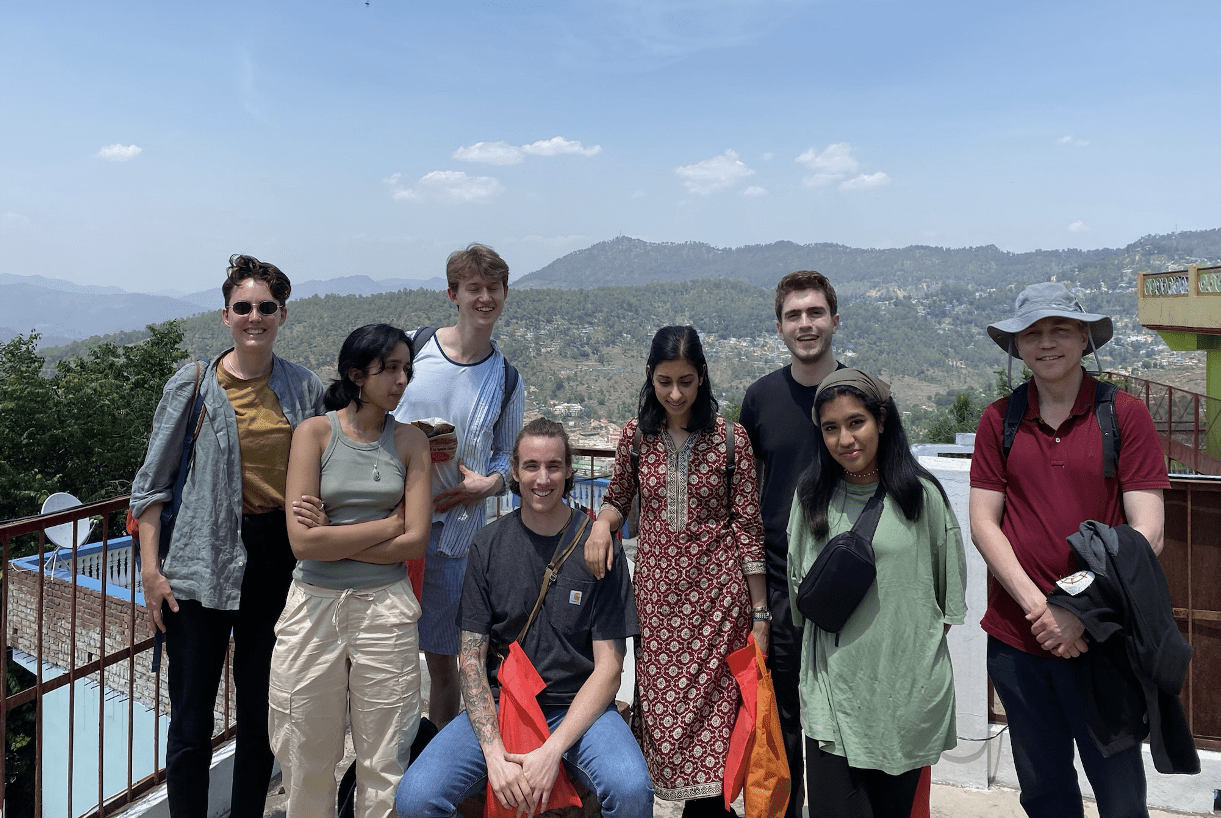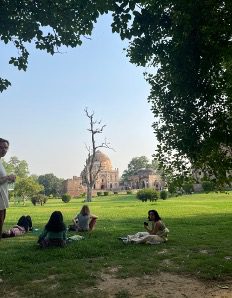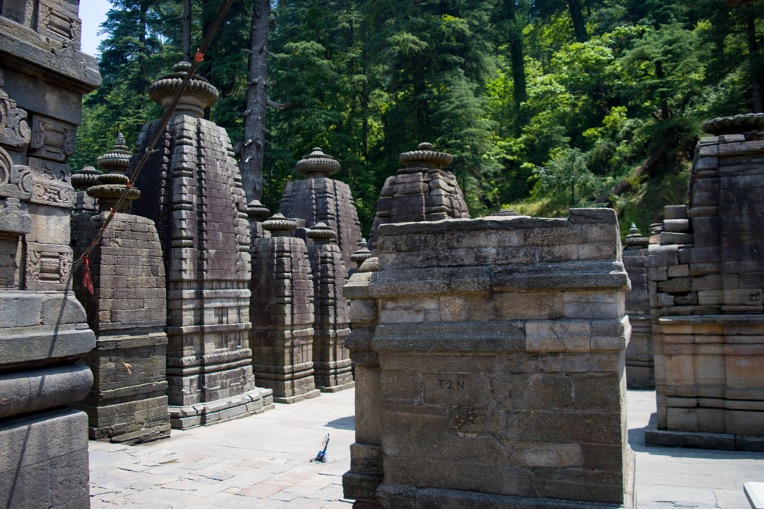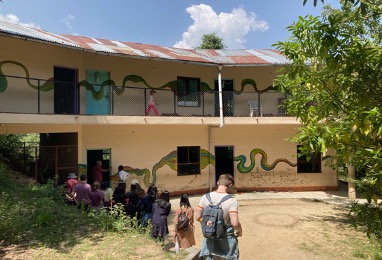This past May, Richard Delacy, Preceptor of Hindi-Urdu, Department of South Asian Studies, Harvard University trekked the foothills of the Himalayas, where he and students from his Hindi-Urdu language class were immersed in an intensive language-learning experience. He shared a firsthand account of his experience below.

In May 2023, I took six students from my intermediate Hindi-Urdu language class, along with the teaching fellow for the introductory class to the state of Uttarakhand in the foothills of the Himalayas for a twelve day, intensive study course. In order to participate on the trip students had to have completed the intermediate level of the language course. It was my hope that they would be in the best possible position to put their knowledge of Hindi-Urdu to the test, and to learn about the linguistic, political, social and cultural complexitites of this region of India. I also wanted them to interact with locals to experience the range of registers that characterize this region, so that they could more fully understand our focus and the emphases we place on certain forms of language and literature in our language courses in the Department of South Asian Studies. This was the second time I had undertaken this venture, and the second time that I had received support from the Provostial Fund, for which I am extremely grateful. I am also grateful to the Lakshmi Mittal and Family South Asia Institute for their generous support in defraying the cost of the airfares for the students so that they could travel to India.
It was an amazing experience for the students, an excellent addition to our Hindi-Urdu language program in the Department of South Asian Studies, and very rewarding for me personally to be able to see these fine young people handle themselves with great cultural sensitivity, conduct themselves with such poise and maturity, and make every effort to learn as much language, and about the region where we stayed for six days while on the trip. Just as in 2018, we spent six days in the mountains in the region of Kumaon. Prior to this we spent two days together in Delhi, where we tried to see as many of Delhi’s amazing historical sites as possible. In the mountains we held classes for an hour a day, before undertaking various activities and excursions to particular sites or hiking in the mountains. The students approached everything with great enthusiasm. They understood the value of the hour-long classes, although they were not a part of their regular curriculum and, hence, they did not receive credit for them. It proved invaluable for them to read and discuss literature, in the very place where Hindi is employed as the primary language.

We all arrived in Delhi between 11 and 12 May. The entire group stayed for at least one night at the YWCA Blue Triangle Guest House, situated conveniently in the heart of Delhi. We all went sightseeing around Delhi on the 13th of May, visiting historical sites such as the Red Fort and Jama Masjid, bookstores, and beautiful gardens. On the night of the 13th we had a group dinner at a Rajasthani restaurant in the heart of Delhi, excited about the adventure that was awaiting us the next day.
On the morning of the 14th of May, we took taxis to New Delhi Railway Station to catch an early morning train to the railhead at Kathgodam in the state of Uttarakhand. Throughout the 5-hour train ride the students engaged with the other passengers, for whom they were a source of intrigue, and who were very keen to ask them about their lives, and their study of Hindi.
From Kathgodam we took taxis which had been arranged for us by the owner of an estate where we stayed in the mountains, near the village of Satoli in Mukteshwar. In the process we climbed to an elevation of 7,000 feet and reached a secluded estate of Chandi Mati at around 3:30 pm.
For the next five days we had a set routine for the day. Breakfast was at 7:30 am. Then we embarked upon an adventure for the morning or day. When we returned we held classes in the afternoons for an hour before dinner. These included the following activities: visiting an NGO primary school (Chirag) (15 May); traveling to the city of Almora by taxi and visiting a school for differently-abled adults and children, where the registered students also engage in craft activities such as weaving, sewing and making bags of various types.

We also ate at the home of a local family and then visited a local temple (16 May); hiked to a temple at the small town of Mukteshwar and then visited a NGO run by women (17 May); drove by taxi to the historic temple site of Jageshwar and Vriddh Jageshwar to view Hindu temples that were constructed between the 7th and the 14th centuries (18 May); and walked in the forest around our accommodation (19 May). Throughout these excursions the students had many opportunities to engage with locals in Hindi to practice their developing language skills. Finally, on 20 May we made our way back down to Kathgodam Station, and boarded the train for the trip back to Delhi. Most of the students departed on the evening of 21 May.
This trip was incredibly successful, and the students came away with an increased love of, and appreciation for, India, Hindi-Urdu and language learning more generally. They came to see that classroom instruction, while it should necessarily impart rigorous intellectual training and expose them to the most important literary traditions as well as modern media in Hindi-Urdu, can never prepare one fully for the complexity of social reality on the ground in India. Most importantly, they had to confront the very real idea that their values, beliefs, and sense of self were radically challenged by being in a very different cultural setting. They were also forced to confront the uncomfortable reality that it is not always so easy to be convinced of the universality of some of the ideas about the sovereignty of the individual that we take for granted in our world in a society that still does, to some degree, remain predicated at least in terms of its self-description on the primacy of community. They grappled with the idea that to become a part of a speech community necessitates to a significant degree accepting the terms in which that community defines itself. Throughout this short trip, I observed how each student was at various stages challenged to reflect on what it means to learn a ‘foreign’ language, when that might necessitate giving up a little bit of one’s self-definition, and radically destabilizing one’s sense of self.
I would like to thank the Provostial Fund for the Arts and Humanities for their support for this trip. It was so successful that I would like to make it a more permanent part of the Hindi-Urdu language program for those who have completed two years of formal instruction at Harvard. The students were extremely mature, engaged, and had a truly amazing time in a scenically beautiful part of India. I am convinced that most will continue their study of Hindi-Urdu after having had the opportunity to experience language in its context and see tangible results from their efforts over the past two years.



